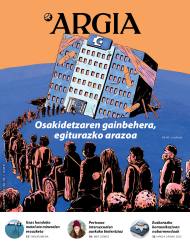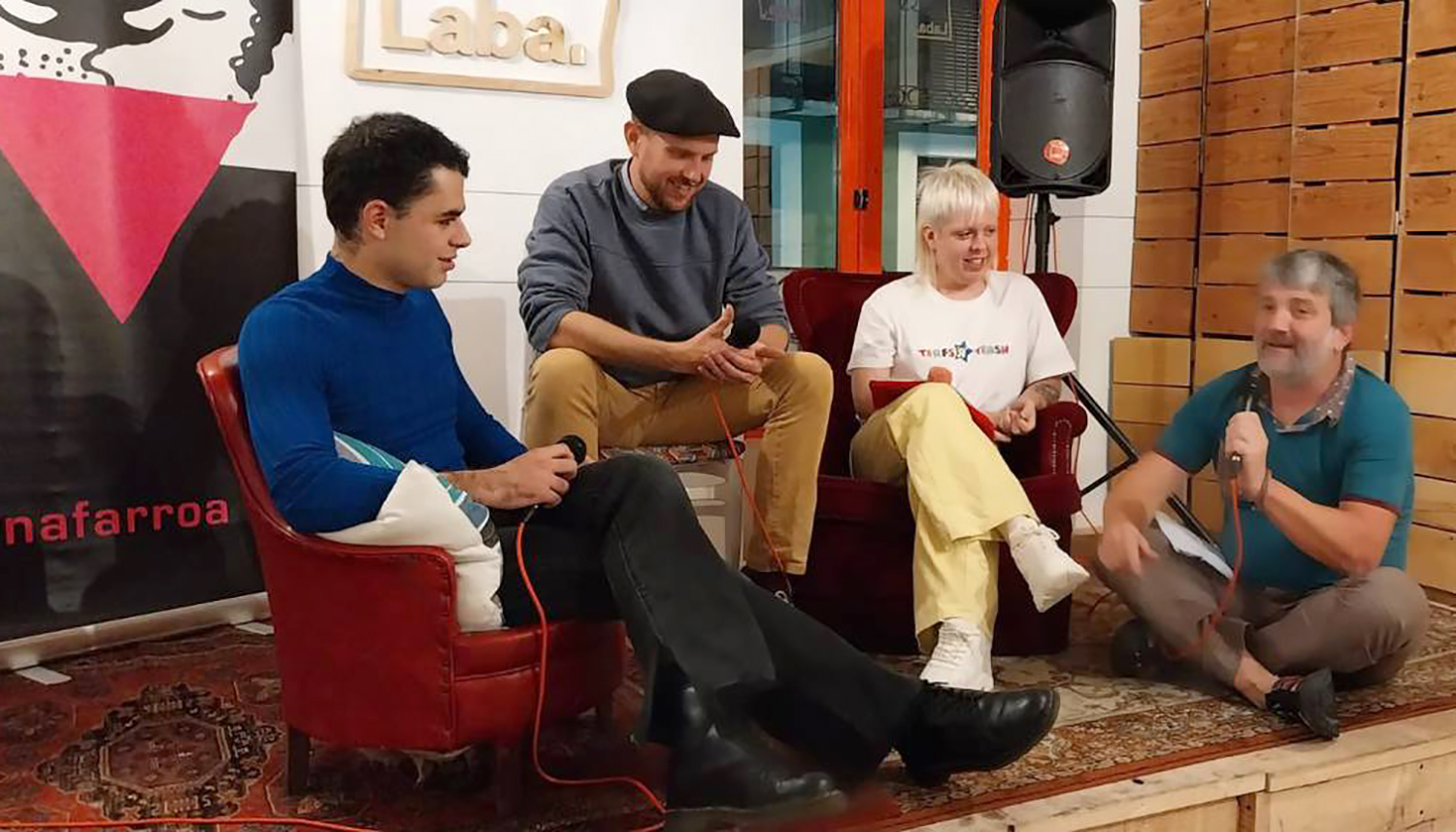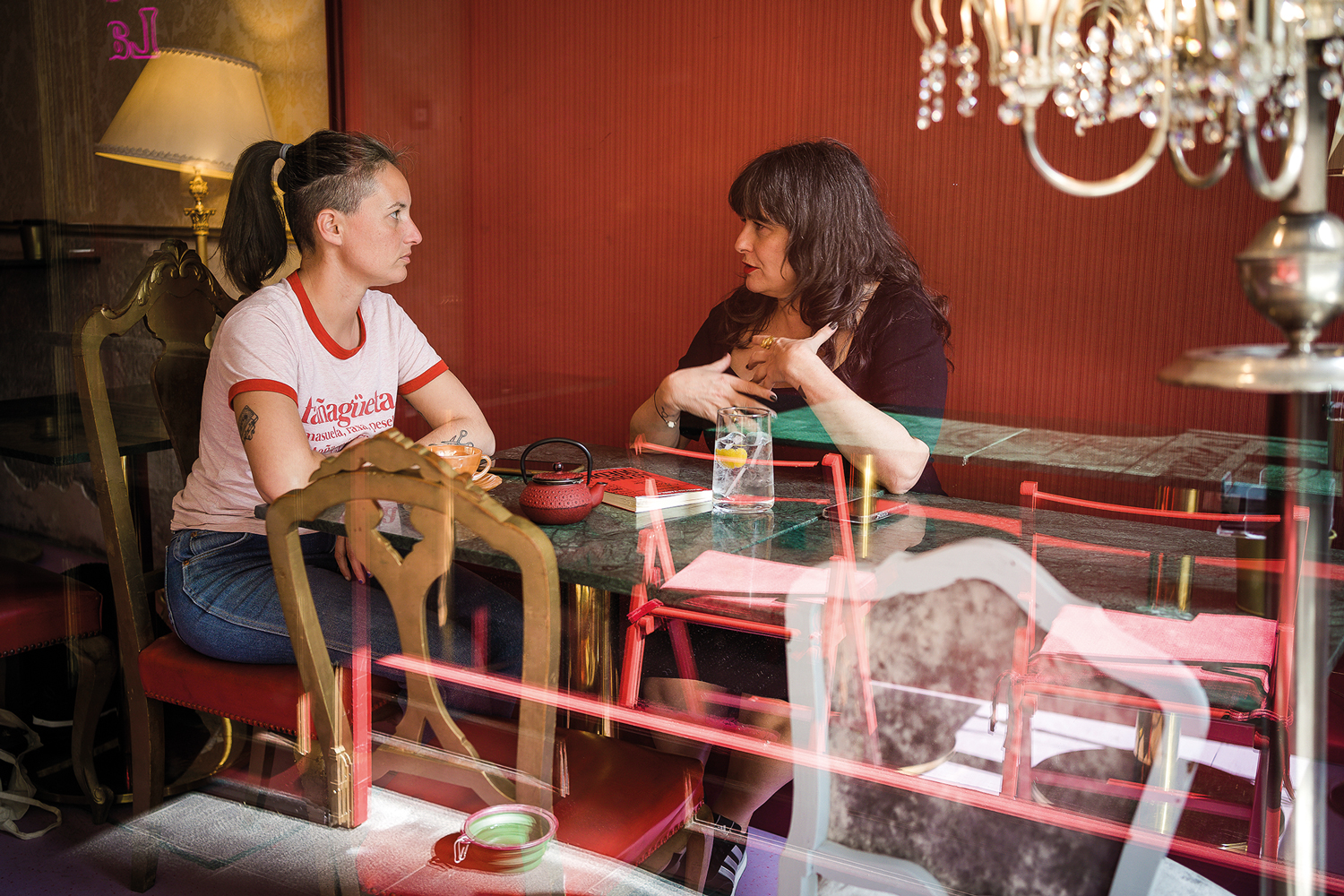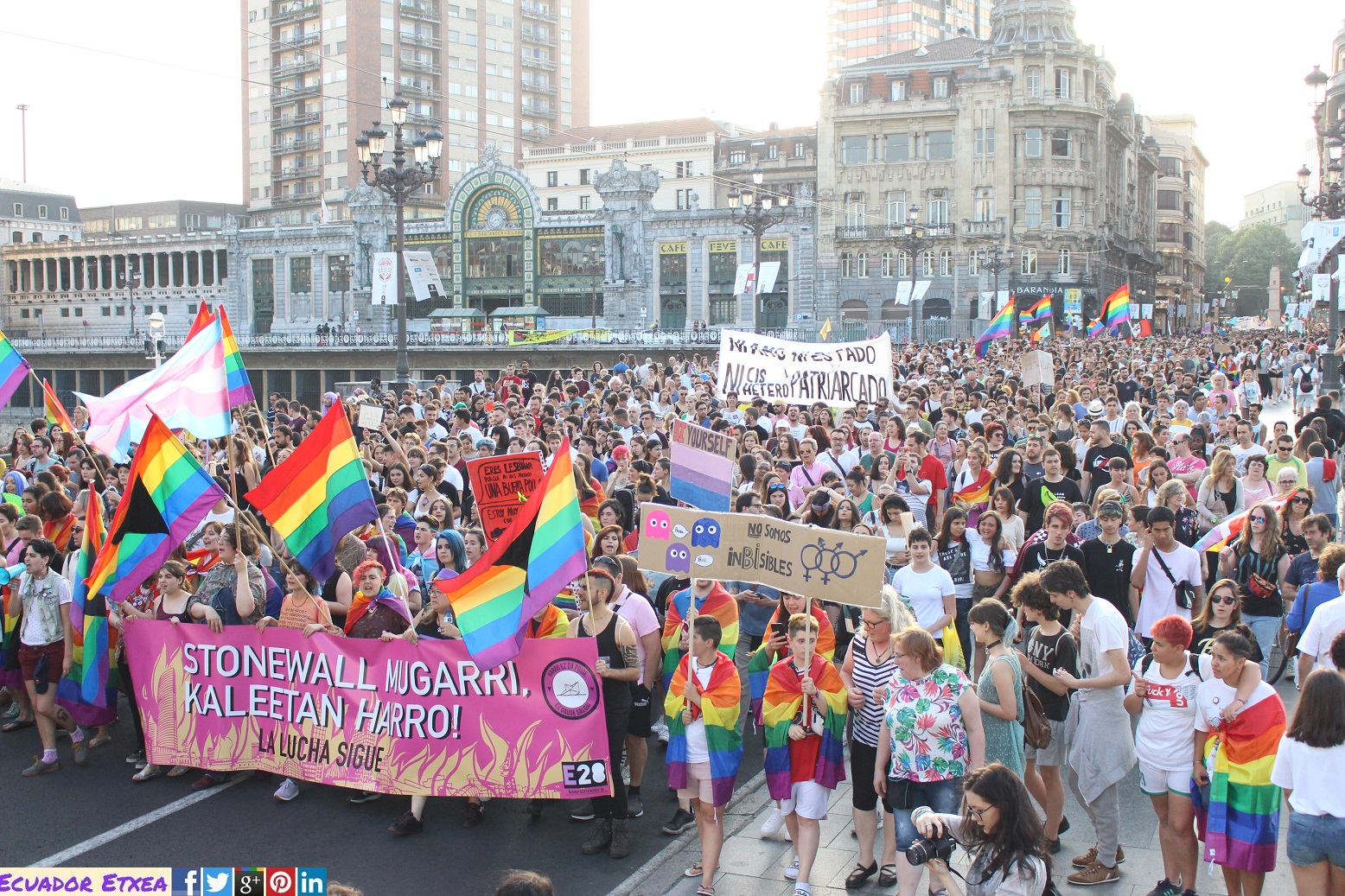"We demand self-determination of one's own body and the right to body integrity"
- The acting writer and activist Mer Gómez was in Euskal Herria in December presenting his book on the theme The Hiena Rebellion (Matxinada). I got to Orereta's conference on the recommendation of a friend and didn't regret it. The next day, in a cafeteria in San Sebastian, Gómez solved my doubts enthusiastically without losing a smile. Let’s see what LGTBIQ+ letter I means.

Mer Gómez. Salamanca, Spain, 1988
Author and intersex activist. She has studied Bachelor of Journalism and later International Studies of Peace, Conflict and Development and Feminist and Gender Studies. He has written and represented two monologues of microtheatre, participated in the short documentary The Revolution of Lola and Only Fit for BICHAS RARE (Jewelry Only) and Recipe silence (Recipe: silence). He's written articles in Pikara Magazine. Since 2020 she has been the coordinator of the Intersex Group I with Laura Vila Kremer. This area of awareness offers training and information on intersexualities and body diversity. She is currently doing her thesis at the University of the Basque Country, within the program of Feminist Studies and Gender Studies.
For those who don't know the term: what are intersexualities? The congenital sexual characteristics of intersex people do not match the
categories of female and male bodies, very rigid in terms of hormones, gonads, genitals and chromosomes to be maintained. Intersexualities are, therefore, everything that does not fall into these two strict categories, and for decades, until today, they have been considered diseases and have been diagnosed.
So they name them in plural, because they're not a thing, not a uniform thing. That's it. It's not a third sex or anything. The truth is, there would be as many sexes as the so-called types of intersexuality. And intersexualities have
been considered diseases, although the characteristics that do not match the binary norm do not affect health. Intersexuality is not a disease, it is not an anomaly of sexual development, it is not syndromes, contrary to what biomedicine has said. However, as a
consequence of this approach, in many cases protocols of change have
been established to adapt intersex bodies to the binary aesthetic standard of bodies.
That also has to do with heteronorma, right? When body change protocols are
carried out, the effect of heteronormatic norms should be taken into account, also aimed at ensuring that intersex bodies comply with this norm. Because intersex bodies, as they are, are neither desirable nor entitled to desire them. And behind all of this, the sex-gender system determines which bodies are worth and which are not. Therefore, the body change protocols are also performed from there. That is, you don't know what will be the orientation of a child's desire in the future and yet you target it to the mandatory heteroara. Why should a person's genitals measure exactly how many centimeters I don't know? Why should a person’s vagina be able to harbor a penis if the person may not have penetration practices in their relationships?
Among other things, they claim that such protocols should be
dispensed with. Members of intersexual activism in the Spanish State follow in part the steps of the international community and claim the end of any mutilation and modification of bodies and genitals, if it is for aesthetic and not for health reasons, provided that the person has not chosen. We therefore demand the self-determination of the body itself, as well as the right to body integrity, and the end of any change, whether bodily or not, that the person himself has decided or accepted.
Of course, we also claim the right to receive all the information: when cases of intersexuality arise, medical and biomedical groups must have complete and plural information. Therefore, in these types of groups, professionals from different branches of health must meet, but also intersex people who are experts in the field, or members of associations or groups of intersex people such as Grapsia or Kaleidos.
Another important key is informed consent. This document is delivered in all interventions and is delivered to the intersantes and their relatives for signature. Informed consent has a number of characteristics to comply with, which at times have not
been fulfilled. Since the occurrence of cases of intersexuality generates a certain psychosocial severity, coercion has been used for the signing of documents – for example, in some cases it has been said that there was a risk of developing tumors –, complete information has not been provided, postoperative effects have not been reported and, in addition, there are a number of days to record the child in the civil registry. In this way everything is speeded up and in many cases the document has been signed with misinformation, misinformation or guidance.
Closing the issue of changes: are they still happening? Today we're on the move, we're getting complicated, and visibility has increased over intersexualities, so
it's true that things are changing, there are medical groups that want to learn and are willing to work with intersex groups. However, some hospitals still operate – for aesthetics and not for health – and sometimes not complete information is provided.
.jpg)
"Why should a person's vagina be able to harbor a penis if the person may not have penetration practices in their relationships?"
What is the current situation of intersex activism in the Spanish state? Many of us have been active for years, starting with smaller,
more private spaces that have gradually become popular. Social movements, the rise of feminism and the demands of the LGTBI have also influenced us, and the members of the intersex community have dared to be there and to translate the letter I.
In the last five years, especially since 2018, there has been an intersex spring, in which we have been disarmed, although letter I is still very invisible and many people do not know what it means or who we are intersex people, that is, we know that it is still a great ignorance, despite everything, I would tell you that intersex people, more than ever, we are there, we are public and we claim our rights.
Let's talk about The Hyena Rebellion. He has
compiled life stories of intersex people. How did it start? I started to disarm and work intersex around 2015-2016. My journey began in 2016, first was depathologization, which led to desarolization as it was forming with others. In 2016, I started to meet the protagonists of the book. In the book I explain the life stories of the people I've found from 2016 to today.
In the process of interviews with these people, what things have caught your attention because they
are similar or totally different from your experiences? I think I've been fed a lot. For intersexes who have not had contact with any association when they were children or more, it is very important that date when they first meet an intersex person. But, beyond that, and as I've discovered as I've been making the book, sit down with a person, and maybe you've already talked to her about your experiences, but sit down with that person in a serious way to listen to her, strip her and undress her, talk about the violence experienced by both… That has been very intense, but very necessary to complete it…
It's been healing. Yes, sharing experiences with another and seeing that at that moment we have had violence and common experiences: for example, we have been pressured to hide intersexuality, not to talk about it, to silence, because medical groups, but also society advised us this: to silence. It was very difficult to talk about letter I when nobody knew anything about it. Then other experiences are
not common according to context.
It has also gathered voices from intersex people outside the Spanish state. Yes, and it has been interesting to talk to an intersex
activist from the French state to know how the situation is not only in France, but also in Europe, to know if the same thing happens with diagnostics, with protocols… See if the same things have been done in France, the United States and Mexico, for example. Speaking to people elsewhere, we have realised that it has been managed in a fairly similar way. It is true, however, that in other places, where health care is not public or not available to all, many people have not gone through medical means and have lived their intersexuality much healthier and more beautiful as part of diversity.
.jpg)
"We demand the end of all mutilation and modification of bodies and genitals for aesthetics and not for health reasons"
In Spain, for example, for older people. Yes, they have also had a different experience. Maybe some people didn't have menstruation, but because generally you didn't talk about menstruation, because sex and sexuality were taboos, no dust was raised. Or some men had breasts, or a smaller penis, or their body was not reproductive, but that was it. So a lot of people, even intersex, didn't know it was. They didn't use medical resources. And that, in my opinion, shows that all those protocols, the protocols that were intended to
be implemented with such gravity and with this drama, many people have not had or have finished any drama… A person in the book, for example, was told that he would die at the age of 30. That was not the case.
He's finishing the thesis. Here
he has also compiled life stories of intersex people, but with another perspective. In the thesis I have also worked with interspersing people, specifically with a team of ten people who, besides intersexes, have been socialized as women. It seemed interesting to me, starting with the group of Feminist Studies and Gender Studies, to talk and analyze whether we feel within feminism, whether we feel or not, that some speeches deny us or do not feel us… That which I had in mind all the time, because I have been a feminist activist and I have still separated myself. So, it seemed fundamental to me that, in addition to counting the processes of depathologization, desarolization and complication we have had among us as intersex, we worked on how the development of a discourse on femininity has been for us.
As you said earlier, today there are medical groups eager to learn and willing to do things differently. Such a project was launched in Osakidetza in 2018, in which you participated. Could you explain to
me what it was like? When I arrived at the Master's Degree in Feminist Studies and Gender Studies, I learned that the Donostia Hospital, in collaboration with other hospitals in the Basque Country, launched a project to work on intersexualities, in which they wanted to integrate the feminist perspective and the gender perspective. Then I and another team researcher joined the project. Today I would say that I am glad that medical groups take into account the feminist perspective and the gender perspective, and not only that, but also intersex people want to participate in these projects, in projects to improve protocols and practices in which cases of intersexuality appear.
On the other hand, after this experience, one of the project leaders, the health worker himself, has developed a doctoral thesis on the subject. Yes, and the conclusions of this
doctoral thesis also seem gratifying to me, because in its conclusions it says that interdisciplinary teams must be created, that intersex associations and groups of people must be informed, that the protocols that have been developed so far must be questioned, and what kind of protocols must be developed from now on. And above all, you don't have to do violence on bodies for aesthetic reasons, without health reasons. It is important to maintain partnerships with medical teams from now on, especially those who are looking forward to developing other protocols. In this regard, I find it gratifying that this thesis has incorporated in its conclusions a broader, more friendly and, above all, in favour of respect for human rights.

























